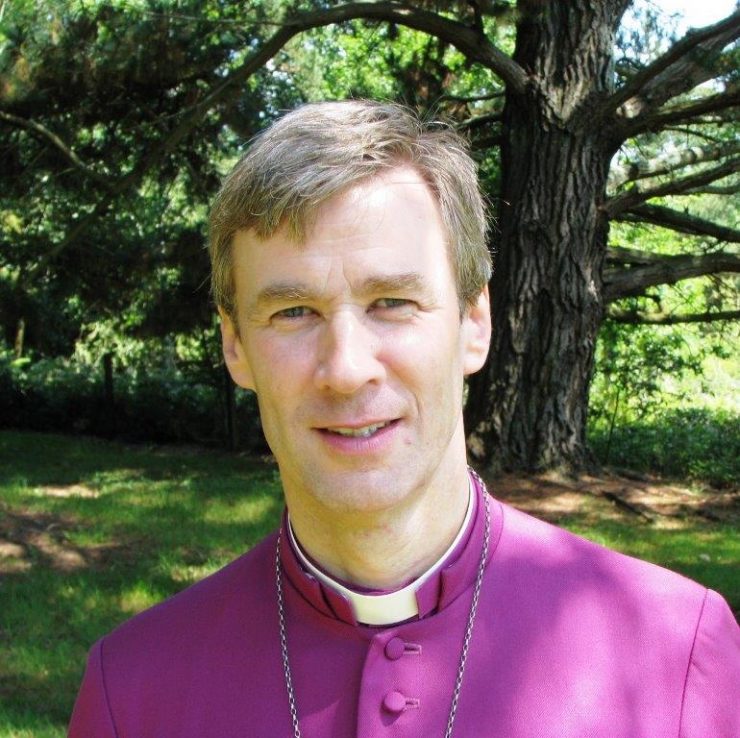Bishop Tim’s Desert Island Book of the Bible
Revd Canon Vanda Perrett, of the Land’s Benefice, organised a rich series of Lent talks, inviting an author, two archdeacons, a professor and two bishops to share their favourite book of the Bible. For the finale, which was held at the fabulous Telegraph Museum in Porthcurno, it was the turn of the Rt Revd Tim Thornton Bishop of Truro, making his first appearance after his sabbatical and, as it transpired, last before the announcement that he is leaving Cornwall and taking up the appointment to become Bishop of Lambeth.
It seems apt, therefore, that his chosen book was 1 Timothy, given the way it defines the noble task of being a bishop (1 Timothy 3v 1-7), and because it’s a book that spoke directly to Bishop Tim’s heart when he was formally appointed Bishop of Truro. It was also the book that he first opened and read when searching and asking God, at the tender age of sixteen, if ordination was what he was being called to pursue.
Speaking amusingly and at times movingly about how 1 Timothy has profoundly affected his life, Bishop Tim, who assured everyone the Bible was originally written in the ancient language of Yorkshire, spoke of the unique value of hope. The book, which is essentially a letter written by an older Christian, Paul, writing to a younger Christian, Timothy, begins with a greeting, “Paul, an apostle of Christ Jesus by the command of God our Savour and of Christ Jesus our hope.” Bishop Tim explained how this is the only example where the writer qualifies Jesus as our Saviour. “It’s one of the reasons why this is my favourite book,” he says. “The distinctive feature of Christians is hope. One of the things that depresses me most is to walk into a church and come across groups of not-hopeful people.”
He recommended the writing of Charles Peguy, a French philosopher, who died in World War One. Peguy says that faith and charity are obvious, that they can walk on their own and are “completely natural, easy-going, simple, easy-coming.” The hard thing is hope. But it’s unique, said Bishop Tim, and it’s what we should put at the heart of our Christian lives.
Hope is a thread that seems to have run through Bishop Tim’s life. The son of an evangelising Anglican vicar given to shouting enthusiastically at his congregation, the young Bishop Tim said he knew, aged sixteen, that he wanted to be ordained into the Church of England. He also recognised in himself a young person who had always gone to church, choir, served and never been through teenage rebellion – something he assured everyone he was looking forward to greatly – and was asking himself if it was too early to make such a decision. He went to Taizé, a Christian community in France that ran massive events for thousands young people at a time, and found a quiet place in a busy environment to listen to what God wanted him to do. “It was obvious in the end,” he said, he knew he had to begin with his namesake, Timothy, and so it was this passage (1 Timothy 6 v 11-16), that spoke to him then and again when he became Bishop of Truro:
But as for you, man of God, shun all this; pursue righteousness, godliness, faith, love, endurance, gentleness. 12 Fight the good fight of the faith; take hold of the eternal life, to which you were called and for which you made the good confession in the presence of many witnesses. 13 In the presence of God, who gives life to all things, and of Christ Jesus, who in his testimony before Pontius Pilate made the good confession, I charge you 14 to keep the commandment without spot or blame until the manifestation of our Lord Jesus Christ, 15 which he will bring about at the right time—he who is the blessed and only Sovereign, the King of kings and Lord of lords. 16 It is he alone who has immortality and dwells in unapproachable light, whom no one has ever seen or can see; to him be honour and eternal dominion. Amen.
From the New Revised Standard Version
This confirmed for him God’s call on his life and so, on return from Taizé, offered himself through the Diocese of Wakefield and found his hope rewarded when he was ordained aged only 23. The intriguing sequel to that happened in 2008/9. Explaining how, at that time, when he was Bishop of Sherborne, a Bishop would not know that he was being considered for another post. So, the first he knew of his move here was when a letter arrived from the Prime Minister of the day, Gordon Brown, congratulating him. Another part of the process was a confirmation election – he told us how the Queen gives permission for the Diocese to vote in a Bishop, so long as they vote for the Bishop that she had selected! The Most Revd Most Honourable Dr Rowan Williams, who was Archbishop then, introduced prayer, worship and reflection around what was a dry, legal process. This included asking the prospective Bishop for a favoured Bible passage. Bishop Tim chose the passage above from 1 Timothy.
The Archbishop looked him in the eye, and talked about the text. “But really, he talked about me,” said Bishop Tim. “It was extraordinarily humbling. He picked up the phrase ‘good confession’ and got straight to my weakness. I know I’m an imposter, a complete fraud, there are many many things I do wrong all the time.” It was heartening, even more so in light of the news that came the next morning, to hear that Bishop Tim, like so many of us, suffers from imposter syndrome. The belief, at times, that he really isn’t qualified to do the task that he has been called to do.
“When I think of confession,” he says, “I think about me needing to say sorry, so when I read this passage before I hadn’t noticed the phrase was repeated. What was stunning was when Rowan spoke to me, he said ‘You, Tim Thornton are worth something, you have been called, you are a child of God, don’t stand back and be the person you could so easily be…’”
He went on to explain how Paul links our confession with Christ’s confession – Jesus wasn’t an imposter. “Standing up tall, shoulders back, I want to confess, profess my faith as Jesus did. Not as an imposter, grovelling with nothing to say, but standing tall and confessing to my faith.”
As he said, we should all stand tall and make the good confession, not just Bishops. We need to have confidence in Christ – to lose that is to fall in on ourselves and feel like an imposter. Add hope to that and those are the two key reasons why Bishop Tim would choose the book of 1 Timothy to take away to a desert island.






